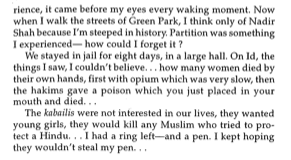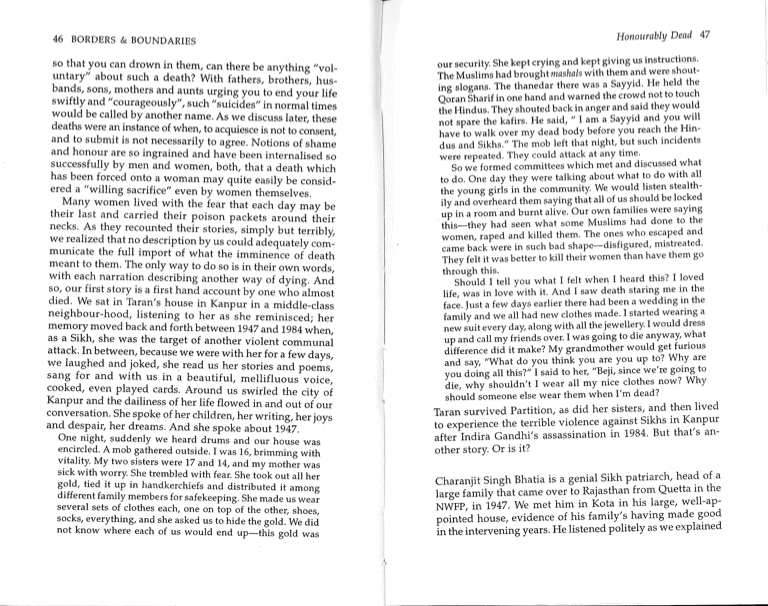“Should I tell you what I felt when I heard this? I loved life, was in love with it. And I saw death staring me in the face… I would dress up and and call my friends over. I was going to die anyways, what difference did it make?”
Taran, 16 years old at Partition
I have thus far spoken only of women choosing to submit to self-sacrifice at their own or someone else’s hands. And indeed, anyone attending the annual remembrance ceremonies held in the gurudwaras of districts like Rawalpindi (especially in Thoa Khalsa) might very well think that there was no resistance amongst women to this kind of violence. These ceremonies are meant to mourn the loss of so many people during those especially brutal days between March 6th and March 13th, and specifically to commemorate the great sacrifice made by the hundreds of women who took their own lives to conserve the honor of the Sikh community. But this ceremony-as well as most memoirs or testimonies that reference honor killings- fail to capture the full spectrum of women’s agency in regards to self-sacrifice. The testimonies of Bimla Bua* and Taran provide us with proof that women did have agency beyond that which necessarily conserved patriarchal values. However, the fact that these women have never been applauded for these decisions (that one even insisted on maintaining anonymity), also speaks to the kind of agency that is or is not allowed within the historical narrative, and what aspects of this agency allows it to be so.
Bimla Bua

Bimla Bua pg. 1

Bimla Bua pg. 2

Bimla Bua pg. 3
Taran

Taran, interviewed in “Borders and Boundaries”
Because Bimla Bua kept a diary, her testimony is especially valuable; any personal retelling of a past memory is subject to the biases of the person telling and hearing the tale, but at least the issue of memory recall is somewhat accounted for. And her story is illuminating on the breadth of this kind of violence. While Thoa Khalsa might be the most renown incidence of honor killings, this “resolution” to “dishonor” clearly transcended any specific place or time during the Partition, speaking volumes of Indian patriarchal notions of the preservation of honor.
But Bua’s story is most notable to me because of her ultimate choice not to kill herself, though she readily admits that it seemed at some point a viable option, and certainly one that the women in her own family were choosing. Bua thus displays her agential capacity beyond that which adheres to the patriarchal order. However, even though she may not have submitted to the pressures of her surroundings, her justifications for not doing so are laden with traditionalism. She claims that she chose not to commit suicide because she had to remain alive to take care of the children and cook for the men- exclusively the burden of women. It would seem that the only way to circumvent one traditional role of woman is to use another such role.
Taran is the only example (that I could unearth, or who was willing to speak) of a woman who chose to live for the very sake of wanting to live, and made no attempt to justify it in patriarchal or traditionally normative terms. But this likely explains why her (and women like her) have not been included in any public discourse or history of even this facet of Partition history. They pose a threat to the narrative that women willingly sacrificed their lives for the good of the honor of the community.
She is the exception rather than the rule, but I thought her story worth mentioning for its touching humanity, a reminder that even in the midst of chaos and bloodshed, a sixteen year old girl could simply want to live and enjoy the life that is being so arbitrarily threatened.
*Name changed in the written testimony so as to safeguard privacy
